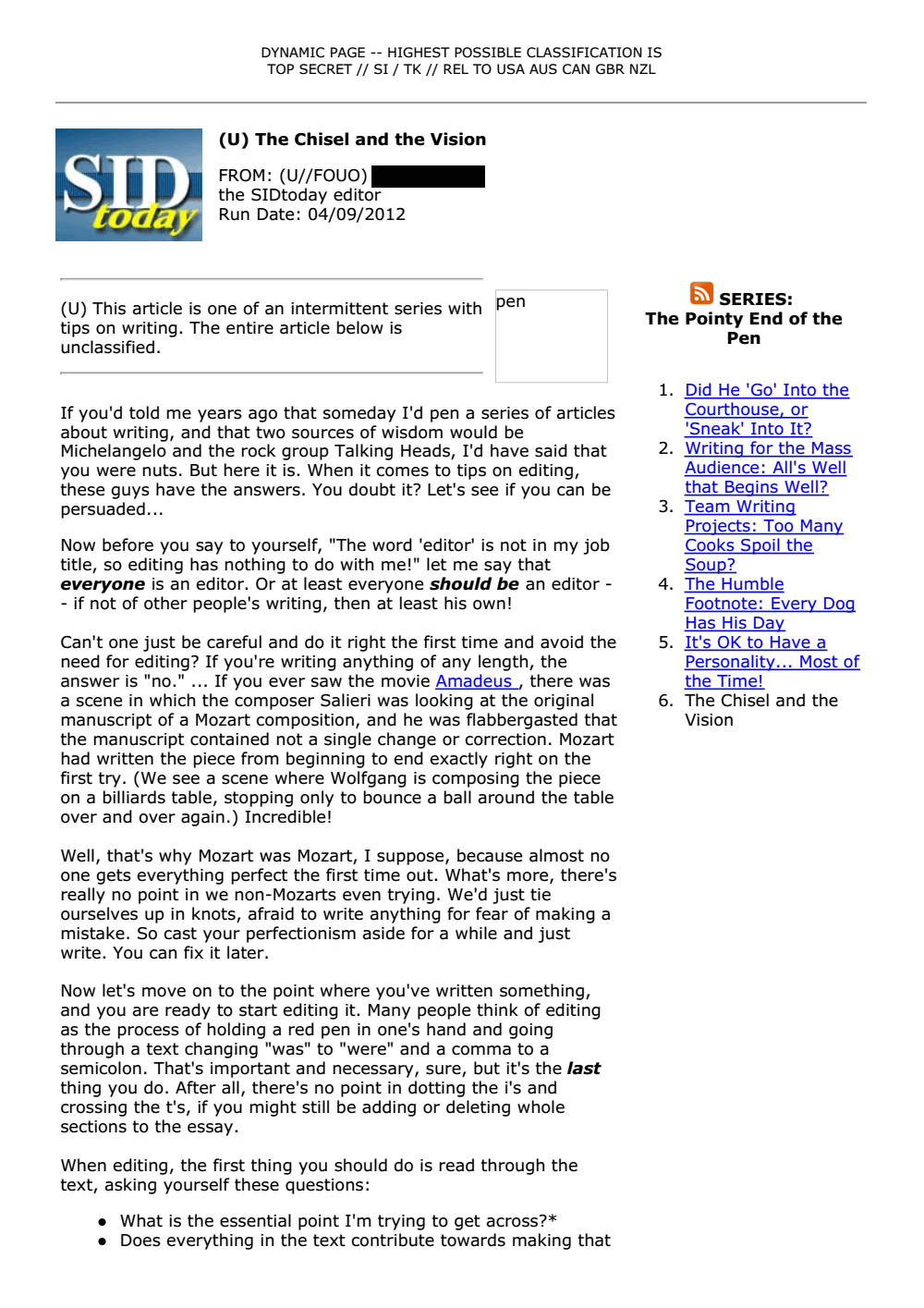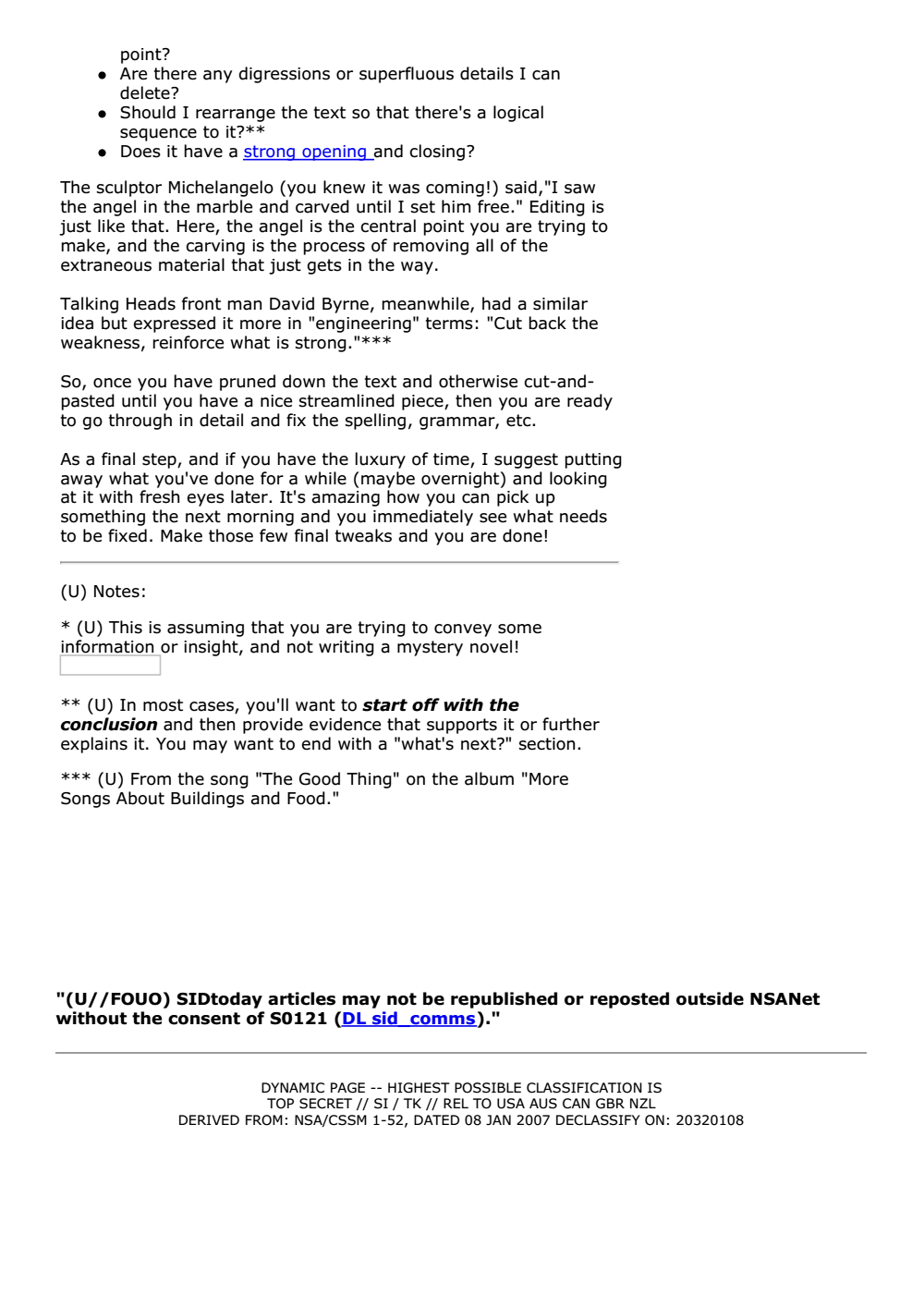
DYNAMIC PAGE -- HIGHEST POSSIBLE CLASSIFICATION IS
TOP SECRET // SI / TK // REL TO USA AUS CAN GBR NZL
(U) The Chisel and the Vision
FROM: (U//FOUO)
the SIDtoday editor
Run Date: 04/09/2012
(U) This article is one of an intermittent series with pen
tips on writing. The entire article below is
unclassified.
If you'd told me years ago that someday I'd pen a series of articles
about writing, and that two sources of wisdom would be
Michelangelo and the rock group Talking Heads, I'd have said that
you were nuts. But here it is. When it comes to tips on editing,
these guys have the answers. You doubt it? Let's see if you can be
persuaded...
Now before you say to yourself, "The word 'editor' is not in my job
title, so editing has nothing to do with me!" let me say that
everyone is an editor. Or at least everyone should be an editor - if not of other people's writing, then at least his own!
Can't one just be careful and do it right the first time and avoid the
need for editing? If you're writing anything of any length, the
answer is "no." ... If you ever saw the movie Amadeus , there was
a scene in which the composer Salieri was looking at the original
manuscript of a Mozart composition, and he was flabbergasted that
the manuscript contained not a single change or correction. Mozart
had written the piece from beginning to end exactly right on the
first try. (We see a scene where Wolfgang is composing the piece
on a billiards table, stopping only to bounce a ball around the table
over and over again.) Incredible!
Well, that's why Mozart was Mozart, I suppose, because almost no
one gets everything perfect the first time out. What's more, there's
really no point in we non-Mozarts even trying. We'd just tie
ourselves up in knots, afraid to write anything for fear of making a
mistake. So cast your perfectionism aside for a while and just
write. You can fix it later.
Now let's move on to the point where you've written something,
and you are ready to start editing it. Many people think of editing
as the process of holding a red pen in one's hand and going
through a text changing "was" to "were" and a comma to a
semicolon. That's important and necessary, sure, but it's the last
thing you do. After all, there's no point in dotting the i's and
crossing the t's, if you might still be adding or deleting whole
sections to the essay.
When editing, the first thing you should do is read through the
text, asking yourself these questions:
What is the essential point I'm trying to get across?*
Does everything in the text contribute towards making that
SERIES:
The Pointy End of the
Pen
1. Did He 'Go' Into the
Courthouse, or
'Sneak' Into It?
2. Writing for the Mass
Audience: All's Well
that Begins Well?
3. Team Writing
Projects: Too Many
Cooks Spoil the
Soup?
4. The Humble
Footnote: Every Dog
Has His Day
5. It's OK to Have a
Personality... Most of
the Time!
6. The Chisel and the
Vision

point?
Are there any digressions or superfluous details I can
delete?
Should I rearrange the text so that there's a logical
sequence to it?**
Does it have a strong opening and closing?
The sculptor Michelangelo (you knew it was coming!) said,"I saw
the angel in the marble and carved until I set him free." Editing is
just like that. Here, the angel is the central point you are trying to
make, and the carving is the process of removing all of the
extraneous material that just gets in the way.
Talking Heads front man David Byrne, meanwhile, had a similar
idea but expressed it more in "engineering" terms: "Cut back the
weakness, reinforce what is strong."***
So, once you have pruned down the text and otherwise cut-andpasted until you have a nice streamlined piece, then you are ready
to go through in detail and fix the spelling, grammar, etc.
As a final step, and if you have the luxury of time, I suggest putting
away what you've done for a while (maybe overnight) and looking
at it with fresh eyes later. It's amazing how you can pick up
something the next morning and you immediately see what needs
to be fixed. Make those few final tweaks and you are done!
(U) Notes:
* (U) This is assuming that you are trying to convey some
information or insight, and not writing a mystery novel!
** (U) In most cases, you'll want to start off with the
conclusion and then provide evidence that supports it or further
explains it. You may want to end with a "what's next?" section.
*** (U) From the song "The Good Thing" on the album "More
Songs About Buildings and Food."
"(U//FOUO) SIDtoday articles may not be republished or reposted outside NSANet
without the consent of S0121 (DL sid_comms)."
DYNAMIC PAGE -- HIGHEST POSSIBLE CLASSIFICATION IS
TOP SECRET // SI / TK // REL TO USA AUS CAN GBR NZL
DERIVED FROM: NSA/CSSM 1-52, DATED 08 JAN 2007 DECLASSIFY ON: 20320108